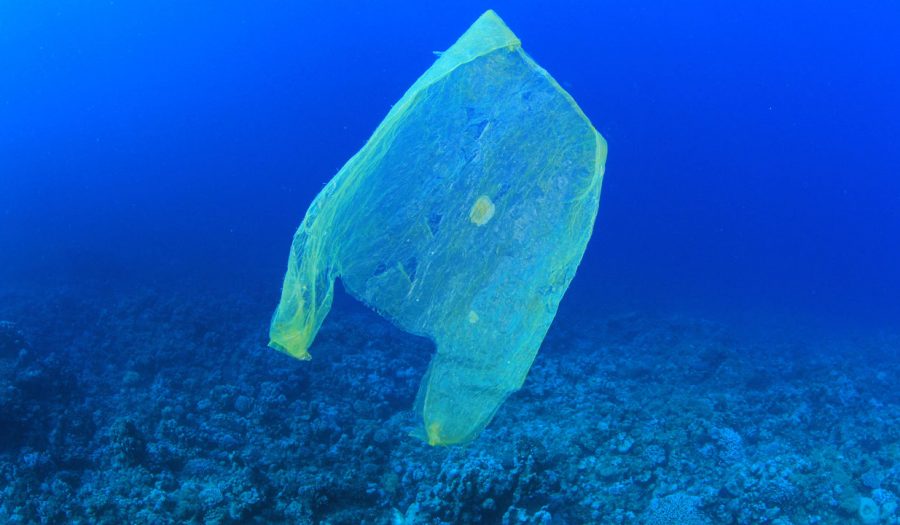Plastic Bags: The Convenient Killers
May 1, 2019
We’ve all encountered them. We’ve all used them in our everyday lives. They’re convenient, practical, and useful for huge Thanksgiving shopping trips and late-night runs to the store for necessities. From grocery stores to mom-and-pop, plastic shopping bags have been a staple in stores all over the world since 1965 due to their durability and inexpensive cost. Each plastic bag costs about a penny to produce, whereas a paper bag costs a little over four cents, pushing stores towards plastic in order to cut costs.
But besides the monetary cheapness of plastic bags, the real cost of plastic bags comes down to their impact on the environment. According to oceancrusaders.org, shoppers are using about 500 billion single use plastic bags per year globally–that’s nearly 67 times more bags than there are human beings on earth. In more physical terms, this means that if you lined up every plastic bag end to end, they would circumnavigate the earth 4,200 times.
There are currently five plastic gyres in the ocean where plastic (primarily bags) gathers due to natural ocean currents, and wildlife feed in these grounds, putting them in danger of mistaking plastic for food like jellyfish. It takes about 1000 years for a plastic bag to break up, which means that marine life (including fish, mammals, and birds) consume these bags, and then die from the consumption of the harmful polymers and chemicals that go into commercial plastic bags.
Once the animal itself decomposes, the bag–still intact–is re-released into the sea, and another animal is in danger of consuming it. If a marine creature manages to not be fooled by a floating plastic bag, there is still a chance that it will die from becoming entangled in floating plastic, and an estimated 100,000 oceanic animals die from plastic entanglement yearly.
Clearly plastic bags are having negative impacts on the ocean, where 50-80% of all life on the planet is concentrated, and places all around the world are beginning to notice. In Ireland, a 15 cent plastic bag tax was imposed, and has been raised to 22 cents in the past year. In Bangladesh, plastic bag use is banned altogether. Within America, these changes are less prevalent, but are beginning to gain relevance in state law.
In August of 2014, California became the first state to enact legislation banning plastic bag usage at large retail stores. The bill also required a 10 cent charge for non plastic bags, and the law was put into place in late 2016. Similarly, Hawaii approved a ban on all non-biodegradable, single use bags in 2015, as well as a ban on bags with less than 40% recycled material.
Most recently, New York passed a 2020 budget bill that bans all use of plastic bags, which was agreed upon by Governor Andrew Cuomo and New York legislative leaders. In a news release from Cuomo’s office in March, it was noted that plastic exceptions would be made for carryout bags, dry cleaning, and plastic bags for produce in grocery stores.
Colorado, a state which has historically been an advocate for environmental protection and aid, has not put any major legislation into place that would limit plastic bag use. Denver City Council, however, has been discussing plastic bag elimination since last December. A law, passed in 1989, stipulates that local governments are not allowed to ban plastic bag use, so this law would need to be repealed before any serious action was put into place.
Within commercial stores, store brands can choose to ban/charge for plastic bags. Whole Foods and Trader Joe’s have green initiatives, and have been using primarily paper bags for years. These stores also offer reusable plastic/fabric bags for purchase. King Soopers and Safeway do not provide information on their respective websites, but King Soopers, after being contacted for more information, says that all plastic bags are being phased out and will be replaced completely by reusable bags in 2025.
Consumers can also make the conscious choice to eliminate plastic within their own homes. By using reusable bags and by choosing paper over plastic, consumers can limit their use of plastic bags. Each person, on average, uses about 150 plastic bags a year, and by decreasing this number, can have a significant impact on the plastic waste in oceans.
Plastic bags are causing irrevocable damage to oceans, and the chemical, damaging properties of these bags will damage the oceans beyond repair, not only affecting oceans but every creature on earth. Plastic bag initiatives being passed will hopefully limit this destruction of oceanic life, but unless some degree of action is put into place, single use plastic bags will continue to damage wildlife and ruin oceans.



